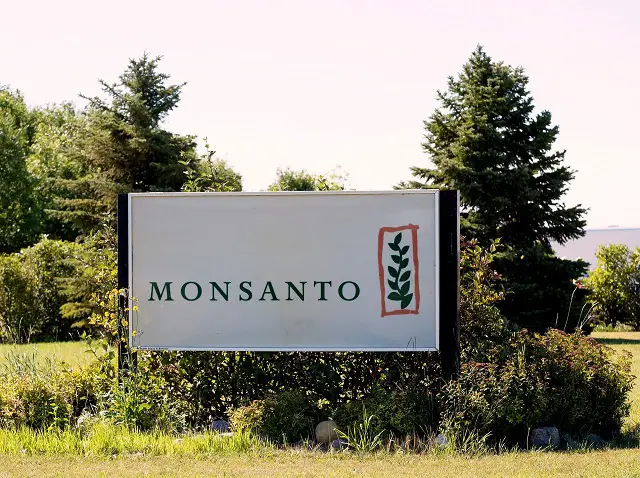
A file photo of Monsanto’s Canadian research center. Photo via Reuters
The Monsanto Company is now a part of Bayer, the German pharmaceutical giant, pesticide manufacturer and producer of GMO seeds.
But despite the official end of Monsanto having taken place in 2018 following Bayer’s purchase, the company, once voted “The Most Evil in the World,” is still making headlines for many of the same controversial reasons.
This time around, the controversy has a familiar feeling, as farmers in Brazil recently ran afoul of one of the company’s most intimidating historical divisions: its patent infringement arm, which has long threatened to sue any farmer who knowingly replants the company’s patented genetically modified seeds, which are manufactured in a laboratory through genetic engineering.
“I Can’t Stand It Anymore…Monsanto Owns Everything”
The ruling, handed down last month by Brazil’s appeals court, reversed a past decision establishing the rights of small farmers in Brazil, the Kiowa County Press, an agricultural publication out of Colorado, reported.
The court’s nine justices unanimously ruled on October 9 that farmers cannot save seeds for replanting if the seeds are harvested from Monsanto’s patented GMO Roundup Ready soybeans, which are genetically engineered in a laboratory to withstand large sprayings of the company’s flagship herbicide Roundup.
The royalties in dispute as part of the lawsuit are estimated at $7.7 billion. The case is likely to be appealed to the Brazilian Supreme Court.
In the original petition, farmers’ unions asserted that Monsanto’s royalty collection system is arbitrary, illegal and abusive.
They said the system aggressively extends Monsanto’s intellectual property rights to their own production and violates their right to freely save seeds for replanting, as guaranteed under Brazil’s Plant Variety Protection Act.
“I can’t stand it anymore, seeing those Monsanto people showing up at the grain elevator and behaving as if they own everything,” one Brazilian cooperative manager told the country’s Congress during a special commission on agriculture in December 2017, according to County Press journalist Karine Elaine Peschard.
Tensions had been brewing between Monsanto and many farmers for years.
Monsanto was originally sued for allegedly collecting royalties illegally and forcing farmers to sign “abusive” purchase contracts back in 2013, according to a report from Sustainable Pulse.
“Monsanto is amoral,” soybean producer and class action suit litigant Luiz Fernando Beninca said in January 2017.
“It will do anything for profits.”
A civil court ruled in favor of the farmers in April 2012, reestablishing their rights to save seeds and sell their harvests as food or raw material without paying royalties. But Monsanto’s legal team was able to overturn the ruling, which led to the Brazilian farmers’ appeal and the recent decision against them on October 9.
The Brazilian court’s nine justices ruled that farmers “cannot save seeds for replanting if the seeds are harvested from Monsanto’s patented Roundup Ready soybeans,” the article said.
These soybeans are genetically engineered to withstand direct applications of the company’s Roundup herbicide, which is comprised of its main ingredient glyphosate, which was declared a “probable human carcinogen” by the World Health Organization’s top cancer research body in spring 2015, as well as a cocktail of other chemicals.
Monsanto said in a statement that the decision will strengthen “agricultural innovation in Brazil.”
The new ruling echoes those made in the United States and Canada in recent years, which concluded that Monsanto’s “Roundup Ready” GMO crops are protected by patent law.
Monsanto has long enjoyed preferential treatment because of its cozy regulation with lawmakers and regulators, critics say, as detailed in books such as ‘Altered Genes, Twisted Truth’ by Steven Druker.
But the company continues to insist that its GMOs and synthetic pesticides are needed to “feed the world.”
RELATED READING: GMO Impossible Burger Tests Positive for High Levels of Monsanto’s Glyphosate
Monsanto Continues to Flood South America with Toxic GMOs
In Brazil, Monsanto receives 2% royalties on the sale of its patented GMO, Roundup Ready soybeans. The company also charges an additional royalty, 3% of farmers’ sales, when soybeans are grown from saved GMO seeds.
Soybeans are Brazil’s biggest export, and are often used in animal feed for grazing cattle.
Critics point out that this system of clearing land for grazing and feeding cattle unnatural diets of pesticide-soaked GMO corn and soy in South America is contributing to deforestation in the rainforest, as well as serious birth defects in Argentinian children, which have sparked large-scale protests.
But Monsanto and Bayer have continued undeterred, as Brazil and South America in general are among the company’s biggest markets worldwide, and are especially important to the its interests considering their GMOs and other products have been increasingly subject to bans across Europe.
Thanks for installing the Bottom of every post plugin by Corey Salzano. Contact me if you need custom WordPress plugins or website design.




